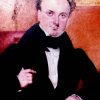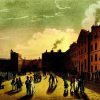Fittingly, Gouger Street is named after one of the most significant of all the reformers associated with the settlement of South Australia. Robert Gouger was the most persistent, determined and driven of all the proponents connected with the foundation of the colony.
The residents of Adelaide owe a permanent and overwhelming debt of gratitude to Robert Gouger, who was in attendance before the ink was dry on Wakefield’s page of classical laissez faireeconomics on emigration. Gouger became an instant adherent, a believer and an advocate for the scheme. Most importantly, he was a ‘doer’ and immediately set about making it happen. He pulled together interested parties in Britain, taking a pivotal role over several years in the lead up to the South Australia Act which passed into law in 1834.
He then awaited his turn in London until the South Australian Colonization Commission appointed him Colonial Secretary in the new colony. It was the Commission’s first appointment. On arrival in the colony he was immediately faced with an overpowering amount of legislative and administrative work, but he didn’t waver for a minute.
Like so many of the other subjects of this book, Robert Gouger was of French Huguenot descent, raised as a dissident Protestant, possessed of a streak of radicalism and an author in his own right. He was the youngest but one of six brothers in a family of eleven children born to Anne Gouger (nee Sibley) and her husband, George Gouger, whose own father and grandfather were both drowned at sea in the pursuit of mercantile affairs in foreign parts.
Robert’s first years were spent at Stamford, in Lincolnshire. He went to school in Nottingham, had a taste for music, literature and the arts, and some of his poetry was published.
In the 1820s he travelled widely throughout the country and the continent and was especially aggrieved by the poverty and inequity he saw throughout Britain, particularly in the larger commercial cities and in London. This led him to believe in and become associated with some of the socialist principles espoused by Robert Owen of Lanark. From this point on Gouger seems to have become a republican, his Huguenot lineage possibly colouring his ideas.
Gouger found the Poor Laws to be frustrating and after befriending Owen looked for philanthropic means to reduce poverty. This led him to a conversation with Wakefield in Newgate Prison while Edward Gibbon was ‘doing time’ for the abduction of the 15-year-old heiress Ellen Turner and had been turning his three years of restraint into productive study, research and reflection on matters to do with colonisation.
Wakefield put his scheme of systematic colonisation to Gouger, who was immediately converted to the basic precepts of the theory. So complete was Gouger’s epiphany that he became Wakefield’s mouthpiece in the community and set about making such an experiment in South Australia a reality. The relationship between Wakefield and Gouger during this period had an irresistible synergy.
With the passage of the Reform Bill there was a concerted effort by Jeremy Bentham and the utilitarians to induce young, idealistic and committed radicals to run for parliament. To ensure that intellectually competent and quality candidates with humanitarian motives were nominated, Francis Place, the radical tailor of Charing Cross and friend of the Wakefields, formed the Parliamentary Candidates Society. Gouger was asked to be Secretary. His potential was immediately evident. His ability to set an agenda, keep records and organise those interested amply demonstrated his talents and the Society voted to remunerate him for his efforts.
The Wakefield proposal remained in the forefront of Gouger’s mind and he plunged into it with all his might. It was his personal, ethical and philanthropic crusade to reduce poverty by colonisation. Unlike Wakefield, he was not especially interested in the economic brilliance or investment potential of the plan. In fact, as it turned out, the project was to be more of a cost than a benefit to him and his family. He spent what little he had on behalf of the South Australian Association, which he formed at the end of 1833, and more than once he was dunned for outstanding debts. Earlier, in 1829, his brother Henry had to provide surety for him, after he had spent two weeks in the King’s Bench (or debtors’) Prison for unpaid printing costs associated with the publishing and printing of Wakefield’s Sketch of a Proposal for Colonising Australasia.
There are several occasions reported in the literature which reveal Gouger’s propensity to weaken under the strain of too much work, especially when it collided with personal tragedy in his life. Once committed to the dogma of Wakefield’s plan in 1829 he pushed hard in all the necessary places to bring the project forward.
On Gouger’s arrival in the colony calamity struck him like a bolt from hell. His young, heavily pregnant wife Harriet had contracted tuberculosis, possibly on board the Africaine during the voyage. He landed her in a tent behind the sandhills at Glenelg. On the day after Proclamation, 29 December 1836, she delivered a son who they named Henry Hindmarsh Gouger, after both his brother and the Governor, John Hindmarsh. However, in the height of an Australian summer and in primitive living conditions, the health of both mother and son began to fail quite rapidly. Gouger’s distress was palpable and heightened the more so because of the uncertainty and disagreement about a proposed site for the new city.
Colonel William Light, who he later praised for the selection of the site, was far inland from where Harriet Gouger died, aged 32, on 14 March. Baby Henry followed the day after. Robert Gouger was left a broken man, both devastated and exhausted. With no respite whatsoever he braced himself again for the heavy workload associated with being Colonial Secretary and stoically met his obligations to the Legislative Council, of which he was a member. Slowly the executive began to sort out the difficulties associated with both the placement of the town and its management.
Try as he might to attend to his official duties in a dispassionate way, Gouger not long afterwards had a falling out with Gilles, the Colonial Treasurer. Resentment between the two, an artefact of some earlier business dealings when Gilles determined he had been swindled by Messrs Gouger & Co., prompted the exchange. Gouger and his brother were East India Army agents and agents for passages to and from India and the colonies. Gilles, on the other hand, had sent his younger brother to Van Diemen’s Land as an agent for the exportation of Saxony Merino sheep. Both families were dealing throughout the British colonies in the 1820s. However, Gilles was a notorious braggart and on the day of the Proclamation disgraced himself by getting totally drunk. Gouger, appalled, raised the matter in Council, presumably in front of Gilles, who was also there as Treasurer, saying he ‘was not fit to be a magistrate in the colony’. This incensed Gilles beyond rapprochement and he proceeded to publicly abuse Gouger around the colony.
The tension between the two simmered for several months and on 16 August 1837 the matter provoked Gouger to action. Encouraged by close friends Charles Mann and Morphett, he approached Gilles seeking his own apology. The Treasurer let loose with a torrent of abuse and called Gouger a liar. At this point Gouger was so incensed that he tweeked Gilles’ nose and an all-out brawl ensued. Blood was drawn and unfortunately for Gilles, Gouger got the upper hand and delivered him a thrashing. It was an outburst which revealed the personal strain the Colonial Secretary was suffering. Governor Hindmarsh, who had become more and more estranged from the radical clique who had overthrown him so often on the Street Naming Committee and who dominated the Legislative Council, seized his chance to victimise Gouger and had him arrested at the point of several marine bayonets.
When the matter went to Council all the other members protested, declaring the Governor’s intention to dismiss Gouger as unconstitutional. Hindmarsh in reply brusquely and arrogantly refused to change his mind and invoked the clause where he had the power to temporarily overrule a Council decision, suspending Gouger until Her Majesty’s pleasure should be known. Gilles, on the other hand, was let off without penalty, other than to have his name removed from the list of magistrates in the colony.
Gouger fell into a deep depression. He resolved to return to England to clear his name. More than ninety colonists, including his close friends from the South Australian Lodge of Friendship, the editorial board of The Southern Australian and those who voted with him on the Street Naming Committee, signed a memorial in support of his reinstatement.
Gouger left for England on 8 November 1837 aboard the Katherine Stewart Forbes. From this point forward he was never the same man again and his anxiety levels began to get the better of him more frequently.
During the voyage he penned his little book entitled South Australia in 1837 in a series of letters, which was full of useful advice to intending colonists and accurate descriptions of what people might come to expect, should they emigrate.
Back in Britain, George Morphett (younger brother to John Morphett) and others gathered around in support, and Gouger was presented with a plate at a special gathering in Birmingham, where they commemorated the contribution he had made to the colony. The commissioners dismissed Hindmarsh’s suspension of him as being invalid and Gouger was reinstated as Colonial Secretary. Very shortly thereafter, he married for a second time. His bride was his cousin, Sarah Whittem, the eldest daughter of James Whittem. The marriage was celebrated on 18 October 1838 at Kenilworth, and they had three children: Robert Sibley Gouger (b. Adelaide 1843), Sarah Adelaide Gouger (b. 1845) and Henry Whittem Gouger (b. 1846).
In February 1839, Gouger returned from England to Adelaide with his new wife to resume as Colonial Secretary. They settled in Strangways Terrace, North Adelaide, overlooking the Park Lands which now make up part of the North Adelaide Golf Course.
Further crises in the colony prompted Gouger to acknowledge that he was no longer capable of keeping up with the huge workload demanded by the position of Colonial Secretary, so he asked Governor Grey whether he could be relieved as Secretary and given a lighter appointment. Grey offered him the position of Treasurer and Gouger stepped aside from his first appointment.
Gouger still retained one or two extraneous positions. He was an agent for John Abel Smith, after whom Carrington Street is named, and the auditor for the South Australian Railway Company which George Fife Angas, George Barnes, William Glegg Gover and Rowland Hill established to build a line between Adelaide and the Port. Gouger also became Chairman of the Adelaide Hospital (in 1844).
His health further deteriorated with an unexplained condition that finally took him about two years later. His colonial supporters gathered around him in his hour of need and sent a memorial to E.G. Stanley, petitioning him to grant Gouger a life pension, but the request was refused on the grounds that he had not served sufficient time as a commissioner.
Robert Gouger died in 1846 after returning home to Britain. He was only 44. The Times notified readers that the death had occurred on Tuesday 4 August at Kensington. His second wife, Sarah was still in her mid-30s. Their two young sons were only 6 and 3 and Sarah Adelaide, who was born on their return to Coventry, was only months old. Ironically, Robert Gouger the son, who was born in Adelaide before the family returned to Britain, was drowned like his great-grandfather and his great-great-grandfather before him.
Robert Gouger’s mortal remains were laid to rest in the family vault owned by Henry Gouger Snr in Norwood, London.






Comments